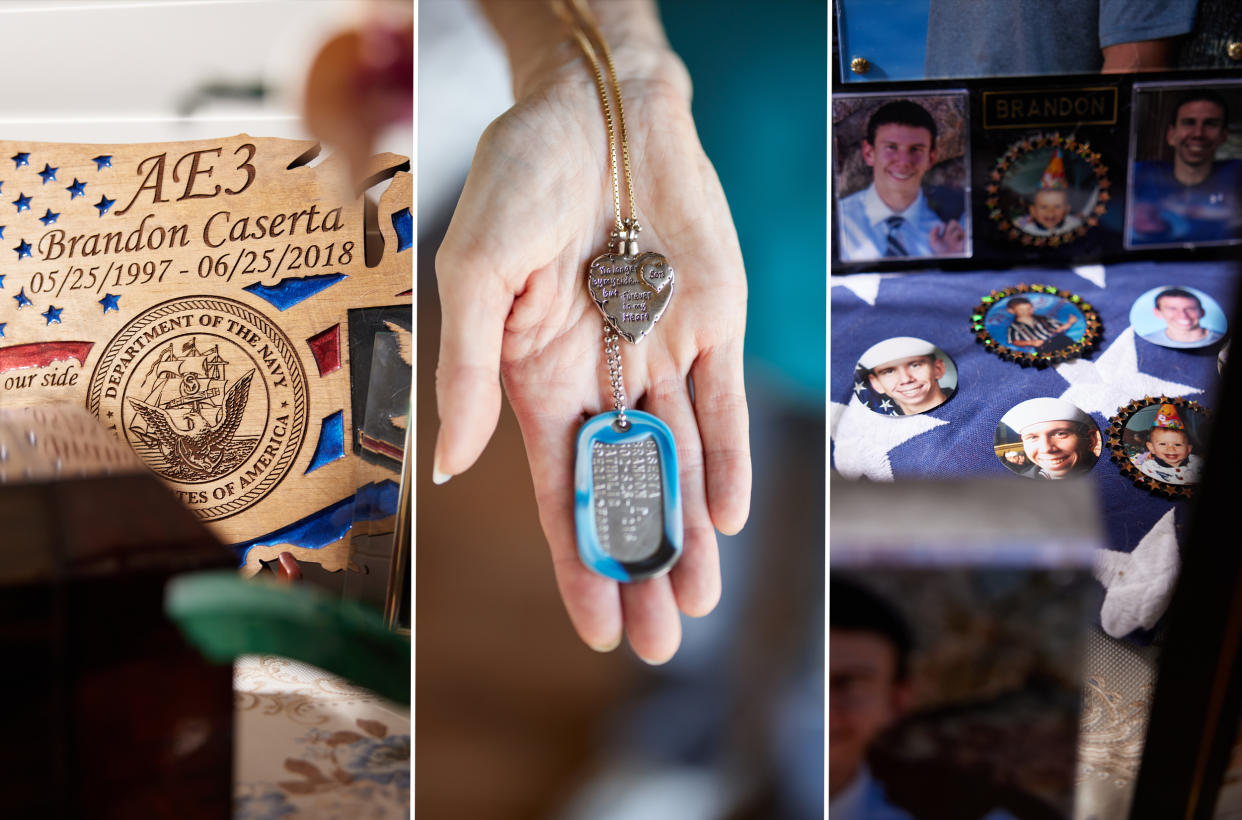After 6 months, law improving mental health care for U.S. service members has not been implemented
The U.S. military has not yet put a six-month-old federal law designed to improve how service members get mental health care into effect, despite a recent rash of suicides in the Navy.
The Brandon Act, which allows members of the military to confidentially seek mental health help, was signed into law by President Joe Biden in December under the 2022 National Defense Authorization Act.
The Navy said officials are "currently establishing implementation policy" for it, a process expected to take another two months, according to Rep. Seth Moulton, D-Mass., who authored the measure.
The time frame has baffled Moulton, military mental health experts and those who work to reduce suicides in the services, particularly as a cluster of suicides on the same Navy ship earlier this year sparked concerns of a mental health crisis.
Moulton said he asked Secretary of Defense Lloyd Austin a year ago about the Pentagon’s commitment to the Brandon Act.
"He assured me that he was ‘prepared to do everything it takes to improve’ and that the service chiefs were focused on it," Moulton said.
Since then, at least five sailors serving on the aircraft carrier USS George Washington in Virginia have died by suicide, including three within a span of a week in April, military officials said.
"I still fail to understand why it has taken so long if this is truly one of Secretary Austin’s priorities," Moulton said.
Unlike in the civilian world, where people can seek mental health care without their employers' knowledge, sailors have to inform their superiors and wait for the next available appointments with military medical providers, a process which can take several weeks, according to several military law attorneys and veterans.
Named after Navy Petty Officer 3rd Class Brandon Caserta, 21, who died by suicide in 2018, the Brandon Act not only expedites mental health evaluations, but also provides a confidential channel for service members to self-report mental health issues.
Both are critical reforms needed to reduce suicides in the services, said M. David Rudd, a Memphis psychologist who specializes in military and veteran suicide prevention.
He said the measure is a “relatively simple, straightforward step” that helps reduce the stigma surrounding mental health that is significantly amplified in the military.
Craig Bryan, a clinical psychologist and Air Force veteran, said fear of potential negative career consequences is one of the most frequently cited barriers to seeking mental health treatment.
“Increasing confidentiality protections could remove this key barrier for many service members who would benefit from mental health treatment,” Bryan, who specializes in military suicides, said.

Caserta’s parents said the Brandon Act could have saved lives had it already been implemented.
"I believe it would have helped a lot if our sailors knew about it," said Teri, 56, who with her husband, Patrick, founded the nonprofit Brandon Caserta Foundation in 2021 to end military suicides.
Caserta was a naval squadron flight electrician serving a helicopter sea combat unit in Norfolk, Virginia, when he killed himself.
Saturday marked the fourth year Teri and Patrick have been without their son, who loved to eat Krispy Kreme doughnuts as much as he loved to exercise and who touched many people in his short life.
From elementary to high school, Caserta often depleted his hot lunch account to buy meals for classmates who forgot theirs or had nothing to eat.
"He was the kindest, most generous person," his mother said.
In a suicide note, Caserta blamed the Navy, saying he had been constantly bullied and abused by a toxic command that denied his requests for mental health services.
Since then, Patrick, 57, said the Navy's treatment of young sailors has only become worse, and that each time another service member dies by suicide, the family relives their greatest loss.
"It’s heartbreaking," Teri said. "Families are going through something that they should not have to be going through."
Patrick said it pains him the most knowing those deaths were preventable.
"It’d be different if they died in combat. Even a fluke safety mishap is different," he said. "You make it a priority, you hold people accountable and it will be different overnight."
The Navy said in a statement to NBC News that it supports the Brandon Act, and that the undersecretary of defense for personnel and readiness was working on how to implement it.
In the meantime, the Navy insists that sailors are not required to inform their chain of command when they seek mental health care, and that they have several ways to do so without notifying a superior, including calling crisis hotlines or speaking to Navy chaplains.

However, they may be required to tell their superiors they have a "medical appointment,” as well as the time and location of the appointment, the Navy said.
Benjamin Gold, a military law attorney, said he believes it is reasonable for the military to take at least eight months or more to consult with its medical community and work through the process, which could have serious long-term ramifications.
“I understand that mental health is a huge problem," said Gold, who was a Naval officer for six years. “But what people tend to forget is that the military is ultimately not about an individual person. It is about a mission.”
He said it can be necessary for the military to know the state of a service member’s mental health if it impacts the ability to perform critical job duties or affects the safety of others on the crew.
He cautioned that implementing the Brandon Act may not be as straightforward as it seems, especially if it involves changing how medical records are created, maintained and evaluated. The military also has to figure out awareness campaigns once the policy is in place.
“This issue of mental health in the military is not as simple as extending patients’ rights,” Gold said. “There are other important considerations, which may supersede a sailor’s right to privacy, and those considerations must be taken into account in implementing this new law.”
Caserta's father said the Navy does not have the luxury of time.
In 2020, the most recent year for which full data is available, 580 military members died by suicide, a 16% increase from 2019, when 498 died by suicide, according to the Department of Defense.
“The problem is people are dying. There is a dire need to put this in place immediately," Patrick said. "This protects someone who’s in a corner and feels there’s no way out.”
From 2016 through 2020, more than 456,000 active-duty service members were diagnosed with at least one mental health disorder, according to Defense Department statistics cited by the nonpartisan Congressional Research Service. About 64% of the diagnoses were attributed to adjustment disorders, anxiety disorders and depressive disorders.
Without more confidentiality and expediency in mental health care, the Casertas and military mental health experts like Rudd say the military won't see much of a change.
"Undeniably," Rudd said, "the Brandon Act is the kind of cultural shift that is essential if you're going to have a significant impact on suicides."
If you or someone you know is in crisis, call the National Suicide Prevention Lifeline at 800-273-8255, text HOME to 741741 or visit SpeakingOfSuicide.com/resources for additional resources. All service members and veterans can also call the Military Crisis Line at 1-800-273-TALK.
